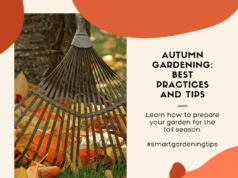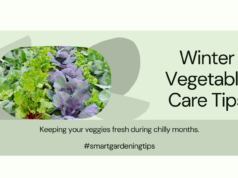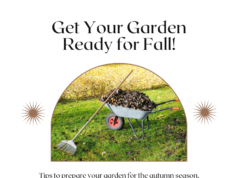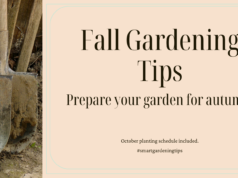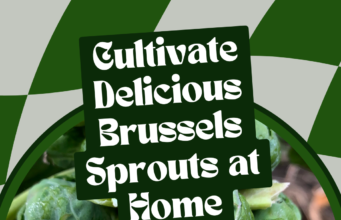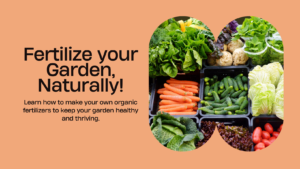
Are you ready to take your vegetable garden to the next level? Look no further! In this article, we will show you how to create homemade organic fertilizers that will nourish your plants and help them thrive. Whether you’re a seasoned organic gardener or just starting out, these DIY recipes will provide your vegetable garden with the natural nourishment it needs.
Key Takeaways:
- Learn how to make homemade organic fertilizers for your vegetable garden.
- Discover the benefits of organic gardening and its sustainable approach.
- Understand the importance of using the right tools and materials.
- Explore different types of fertilizers suitable for organic gardening.
- Get practical DIY recipes for vegetable plants, flowering plants, and fruit trees.
Introduction to Organic Gardening
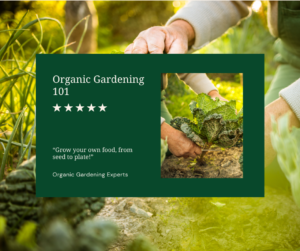
Before diving into the DIY fertilizer recipes, it’s important to understand the basics of organic gardening. Organic gardening is a sustainable and eco-friendly approach to growing plants without the use of synthetic chemicals or pesticides. By following the principles of organic gardening, you can create a thriving garden that nurtures not only your plants but also the environment.
Organic gardening is rooted in the belief that the health of plants is interconnected with the health of the soil. Instead of relying on artificial fertilizers and pesticides, organic gardeners focus on building healthy, fertile soil through natural means. This holistic approach nurtures a balanced ecosystem, promotes biodiversity, and protects the long-term health of the garden.
By practicing organic gardening, you are not only creating a safe and healthy environment for your plants but also contributing to the greater well-being of the planet. Organic gardening reduces the use of toxic chemicals, preserves water quality, and promotes pollinator health. It’s a way to ensure that the food you grow is free from harmful residues and packed with nutrients.
Organic gardening is more than just a growing method; it’s a way of living in harmony with nature, embracing its cycles and rhythms.
In the following sections, we will explore the principles and benefits of organic gardening in more detail, equipping you with the knowledge and inspiration to embark on your organic gardening journey.
Essential Tools and Materials for Organic Gardening
To successfully implement organic gardening practices, you need the right tools and materials. Creating a well-equipped organic garden will ensure that you can maintain plant health and growth while minimizing harm to the environment. Here are some essential tools and materials you should have on hand:
Gardening Tools
Having the right gardening tools is essential for tending to your organic garden. Here are a few must-have tools:
- Garden gloves: Protect your hands from thorns, chemicals, and dirt.
- Trowel: Useful for digging small holes and transplanting seedlings.
- Garden fork: Helps loosen soil and remove weeds.
- Pruning shears: Ideal for trimming plants and removing dead twigs or branches.
- Watering can or hose: Essential for watering plants without damaging them.
These tools will assist you in various gardening tasks, ensuring that you can maintain your organic garden with ease.
Organic Materials
Using organic materials is key to creating a natural and sustainable garden environment. Here are some organic materials you should consider:
- Compost: A nutrient-rich soil amendment made from organic waste such as vegetable scraps, coffee grounds, and fallen leaves.
- Mulch: Helps retain moisture, suppresses weed growth, and improves soil structure.
- Manure: Provides essential nutrients and improves soil fertility.
- Seaweed: Rich in minerals and beneficial microorganisms, seaweed can be used as a natural fertilizer or added to compost.
- Organic pest control products: Natural methods such as neem oil, insecticidal soaps, and companion planting can help control pests without harming the environment.
By incorporating these organic materials into your gardening practices, you’ll foster a healthy ecosystem in your organic garden.
Creating a Well-Equipped Organic Garden
Now that you know the essential tools and organic materials for your garden, it’s time to put them to use. Consider the specific needs of your plants and design your garden accordingly. Here’s an example of how you can organize your essential tools and materials:
| Essential Tools | Organic Materials |
|---|---|
| Garden gloves | Compost |
| Trowel | Mulch |
| Garden fork | Manure |
| Pruning shears | Seaweed |
| Watering can or hose | Organic pest control products |
By ensuring you have the essential tools and materials for organic gardening, you’ll be well-equipped to create a thriving and sustainable garden. The right tools and organic materials will contribute to the health of your plants and the overall success of your organic garden.
Understanding Fertilizers for Organic Gardening
In organic gardening, understanding fertilizers is essential for promoting plant health and maximizing yields. Fertilizers provide vital nutrients that plants need to thrive, ensuring they receive the right balance of elements for optimal growth. Let’s explore the importance of fertilizers and the different types available to nourish your organic garden.
The Importance of Fertilizers
Fertilizers are crucial in organic gardening as they replenish the nutrients that plants extract from the soil. By providing essential elements such as nitrogen, phosphorus, and potassium, fertilizers promote strong root development, healthy foliage, and abundant blooms or fruiting.
“Fertilizers play a vital role in organic gardening by replenishing vital nutrients that plants need for optimal growth.”
By using organic fertilizers instead of synthetic alternatives, you can avoid harmful chemicals and ensure the long-term sustainability of your garden. Organic fertilizers are derived from natural sources such as plants, animals, and minerals, making them safe for the environment and beneficial for soil health.
Types of Organic Fertilizers
Organic gardening offers a wide range of fertilizer options that provide the necessary nutrients for your plants. Some common types of organic fertilizers include:
- Compost: Made with organic matter such as kitchen scraps, yard waste, and manure, compost is a rich source of nutrients and beneficial microorganisms.
- Bone Meal: Derived from animal bones, bone meal is high in phosphorus, which promotes strong root growth and flowering.
- Fish Emulsion: A byproduct of fish processing, fish emulsion is rich in nitrogen and provides a quick source of nutrients for plants.
- Blood Meal: Made from dried animal blood, blood meal is high in nitrogen and ideal for promoting lush, green foliage.
- Seaweed Fertilizer: Seaweed is abundant in trace minerals and growth-promoting hormones, making it an excellent choice for overall plant health.
These are just a few examples of the many organic fertilizers available. Each type offers unique benefits and nutrient profiles. Experimenting with different fertilizers can help you find the best options for your specific plants and garden.
Meeting Your Plant’s Nutritional Needs
Understanding your plant’s nutritional needs is crucial for selecting the right fertilizers. Different plants have varying requirements for nutrients, and certain stages of growth may demand specific fertilizers.
For instance, leafy greens benefit from nitrogen-rich fertilizers, promoting healthy foliage and quick growth. Fruiting plants, on the other hand, require more phosphorus to support flower and fruit development.
By observing your plants’ growth patterns and understanding their nutrient requirements, you can tailor your fertilizer application to provide balanced and targeted nourishment.
A Comparison of Different Types of Organic Fertilizers
| Fertilizer Type | Nutrient Content | Main Benefits |
|---|---|---|
| Compost | Varying nutrient levels depending on the source materials | Improves soil structure, enhances microbial activity |
| Bone Meal | High in phosphorus | Stimulates root growth, promotes flowering |
| Fish Emulsion | High in nitrogen | Provides fast-acting nutrients, enhances overall growth |
| Blood Meal | High in nitrogen | Boosts foliage growth, deters pests |
| Seaweed Fertilizer | Rich in trace minerals and hormones | Increases plant vigor, improves stress resistance |
Understanding fertilizers is a key aspect of successful organic gardening. By selecting the right fertilizers and providing your plants with the nutrients they need, you can nurture a thriving garden while maintaining the principles of sustainability and environmental consciousness.
Different Types of Fertilizers for Organic Gardening
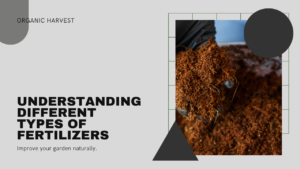
When it comes to organic gardening, choosing the right fertilizer is essential for promoting healthy plant growth and maximizing yields. Thankfully, there are various types of fertilizers available that are specifically designed for organic gardening practices. Let’s explore some of these options:
Compost:
Compost is often referred to as “black gold” in the gardening world due to its rich nutrient content and ability to improve soil structure. It is made from the decomposition of organic matter such as kitchen scraps, garden waste, and yard trimmings.
Manure:
Manure from animals such as cows, horses, and chickens is another excellent source of organic nutrients. It is typically aged or composted before use to reduce the risk of weed seeds and pathogens. Manure provides essential minerals like nitrogen, phosphorus, and potassium.
Bone Meal:
Derived from the ground-up bones of animals, bone meal is a slow-release fertilizer rich in phosphorus and calcium. It is particularly beneficial for promoting strong root development and enhancing overall plant health.
Seaweed and Kelp:
Seaweed and kelp-based fertilizers are extracted from marine plants. They are packed with trace minerals, growth hormones, and beneficial microorganisms, making them an excellent option for improving plant tolerance to stress and boosting overall growth.
Organic Liquid Fertilizers:
Organic liquid fertilizers are convenient and easy to use. They are made from natural ingredients such as fish emulsion, seaweed extracts, and compost tea. These fertilizers provide a quick nutrient boost and are absorbed by plants more rapidly.
By incorporating a combination of these fertilizers into your organic gardening routine, you can provide your plants with the essential nutrients they need for optimal growth and productivity.
Remember, organic fertilizers not only nourish your plants, but they also improve soil health and promote sustainability in your garden.
Next, we’ll delve into the importance of using homemade fertilizers in organic gardening and how they offer numerous benefits for your garden.
Importance of Using Homemade Fertilizers
When it comes to organic gardening, using homemade fertilizers offers numerous benefits. Not only do these DIY fertilizers provide natural nourishment for your plants, but they also promote sustainability and reduce waste. By incorporating homemade fertilizers into your gardening routine, you can take full control of what goes into your soil and ensure that your plants receive chemical-free nutrition.
One of the key advantages of homemade fertilizers is their eco-friendly nature. Unlike synthetic fertilizers that may contain harmful chemicals and pollutants, homemade fertilizers are made from organic materials that are readily available and sustainable. By utilizing kitchen scraps, garden waste, and other organic matter, you can minimize your impact on the environment while still providing your plants with the necessary nutrients they need to thrive.
Homemade fertilizers are not only effective, but they also allow you to repurpose waste and reduce your carbon footprint, making them an excellent choice for eco-conscious gardeners.
In addition to their environmental benefits, homemade fertilizers can also save you money. Instead of purchasing expensive commercial fertilizers, you can create your own using readily available ingredients. Kitchen scraps like coffee grounds, eggshells, and vegetable peels can be transformed into nutrient-rich compost that will nourish your plants. This cost-effective approach to fertilizing your garden ensures that you can enjoy a thriving organic garden without breaking the bank.
Benefits of Homemade Fertilizers:
- Sustainable: Utilize organic materials and reduce waste
- Chemical-free: Avoid harmful chemicals found in synthetic fertilizers
- Cost-effective: Create fertilizers using readily available ingredients
- Nutrient-rich: Provide plants with natural and balanced nutrition
- Enhanced soil health: Improve soil structure, fertility, and microbial activity
- Promote biodiversity: Support beneficial organisms and pollinators
To visualize the benefits of using homemade fertilizers in your garden, take a look at the table below:
| Chemical Fertilizers | Homemade Fertilizers | |
|---|---|---|
| Environmental Impact | May contain harmful chemicals and pollutants | Utilizes organic materials, reduces waste, and promotes sustainability |
| Cost | Expensive | Cost-effective, utilizes readily available ingredients |
| Plant Health | Can provide quick but temporary results | Provides slow-release nutrients and improves soil health over time |
| Soil Quality | May degrade soil health and microbial activity in the long run | Enhances soil structure and fertility, promotes microbial activity |
As you can see, homemade fertilizers offer a range of advantages that contribute to the overall well-being of your garden. By utilizing natural and sustainable materials, you can create a thriving organic garden while minimizing your impact on the environment.
DIY Fertilizer Recipes for Vegetable Plants
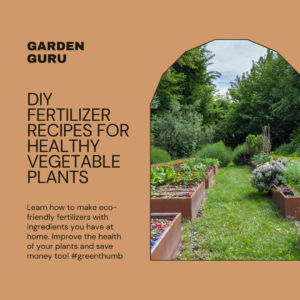
Now that you understand the principles of organic gardening, it’s time to nourish your vegetable plants with homemade fertilizers. These DIY fertilizer recipes will provide your vegetable garden with the essential nutrients it needs to thrive.
All-Purpose Organic Fertilizer Recipe
If you’re looking for a versatile fertilizer that promotes overall plant health, try this all-purpose organic recipe:
- Mix 1 part well-decomposed compost with 1 part worm castings. These organic materials are rich in nutrients and beneficial microorganisms.
- Add 1 tablespoon of rock phosphate and 1 tablespoon of kelp meal to the mixture. Rock phosphate provides a slow-release source of phosphorus, while kelp meal enriches the soil with trace minerals.
- Combine the ingredients thoroughly, ensuring an even distribution of nutrients.
- Apply the fertilizer to the base of each vegetable plant, avoiding contact with the plant foliage.
- Water the plants thoroughly after applying the fertilizer to allow the nutrients to penetrate the soil.
Natural Plant-Based Liquid Fertilizer Recipe
For a quick and easy liquid fertilizer to boost the health and productivity of your vegetable plants, try this plant-based recipe:
- Collect a variety of plant materials, such as weeds, grass clippings, or kitchen scraps.
- Chop or tear the plant materials into small pieces to speed up the decomposition process.
- Place the plant materials in a bucket or container and cover them with water.
- Allow the mixture to steep for 1 to 2 weeks, stirring occasionally.
- After the steeping period, strain the liquid to remove any solid particles.
- Dilute the liquid fertilizer with water at a ratio of 1 part fertilizer to 10 parts water.
- Apply the diluted fertilizer to the base of your vegetable plants, making sure to saturate the soil.
These DIY fertilizer recipes offer a cost-effective and environmentally friendly way to nourish your vegetable plants. By incorporating these organic fertilizers into your gardening routine, you can enjoy a bountiful and healthy vegetable harvest.
“DIY fertilizer recipes tailored specifically for vegetable plants.”
DIY Fertilizer Recipes for Flowering Plants
Flowering plants bring beauty and vibrancy to any garden. To ensure they thrive, it’s crucial to provide them with the specific nutrients they need. In this section, we will explore DIY fertilizer recipes that are tailored to enhance the growth and blooming of your beloved flowering plants.
1. Homemade Compost Tea
Compost tea is a nutrient-rich liquid fertilizer that promotes healthy plant growth and encourages abundant blooms. It’s easy to make and requires only a few simple ingredients:
- 1 part well-aged compost
- 5 parts water
- 1 tablespoon molasses (optional)
To make homemade compost tea, follow these steps:
- Fill a bucket or container with water.
- Add the well-aged compost to the water, stirring gently.
- If desired, add the molasses to increase microbial activity.
- Cover the container and let the mixture steep for 1 to 2 days.
- Strain the liquid using a fine mesh sieve or cheesecloth.
- Dilute the compost tea with water at a ratio of 1:10.
- Apply the diluted compost tea to the base of your flowering plants, avoiding the foliage.
This homemade compost tea will provide your flowering plants with essential nutrients, beneficial microorganisms, and organic matter, promoting healthy growth and vibrant blooms.
2. Banana Peel Fertilizer
Don’t throw away those banana peels! They can be repurposed to create a simple and effective fertilizer for your flowering plants. The rich potassium content in banana peels promotes flower development and overall plant health. Here’s how you can make banana peel fertilizer:
- Collect banana peels from ripe bananas.
- Remove any remaining fruit flesh from the peels.
- Cut the peels into small pieces to speed up the decomposition process.
- Add the banana peels to a jar or container.
- Cover the peels with water, ensuring they are fully submerged.
- Place the lid loosely on the container to allow for fermentation gases to escape.
- Let the mixture sit for approximately 1 week, stirring occasionally.
- After a week, strain the liquid from the banana peels.
- Dilute the liquid with water at a ratio of 1:5.
- Apply the diluted banana peel fertilizer to the soil around your flowering plants.
This natural fertilizer will provide your flowering plants with potassium, phosphorus, and other essential minerals, promoting robust blooms and healthy foliage.
Using these DIY fertilizer recipes, your flowering plants will receive the nourishment they need to flourish and produce stunning blooms. With a little time and effort, you can create organic fertilizers that are not only beneficial for your plants but also gentle on the environment.
DIY Fertilizer Recipes for Fruit Trees
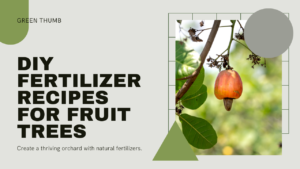
Fruit trees have unique nutritional requirements to produce healthy and abundant fruits. In this section, we will provide you with DIY fertilizer recipes specifically designed for fruit trees. By using these homemade organic fertilizers, you can nourish your fruit trees naturally and promote optimal growth and fruit development.
1. Epsom Salt and Eggshell Fertilizer
This DIY fertilizer recipe combines the benefits of Epsom salt and crushed eggshells to provide essential nutrients to your fruit trees. Epsom salt is rich in magnesium, which helps improve fruit quality, while eggshells are a great source of calcium for strong and healthy roots.
- Mix 1 tablespoon of Epsom salt with crushed eggshells from 3-4 eggs.
- Spread the mixture evenly around the base of each fruit tree.
- Gently work the fertilizer into the soil, taking care not to damage the tree roots.
- Water the trees thoroughly to help the nutrients reach the roots.
2. Nutrient-Rich Seaweed Fertilizer
Seaweed is a natural fertilizer that is rich in trace minerals and growth-promoting hormones. Using this DIY seaweed fertilizer can enhance the overall health and productivity of your fruit trees.
- Collect fresh seaweed from beaches or purchase dried seaweed from garden centers.
- Rinse the seaweed thoroughly to remove excess salt.
- Chop the seaweed into small pieces using shears or a sharp knife.
- Place the chopped seaweed in a bucket and fill it with water.
- Allow the seaweed to soak in the water for at least two weeks, stirring occasionally.
- Strain the liquid and dilute it with water at a ratio of 1:10.
- Apply the seaweed fertilizer to the base of your fruit trees, avoiding contact with the leaves.
Incorporating these DIY fertilizer recipes into your fruit tree care routine will help ensure they receive the nutrients they need for healthy growth and bountiful harvests. Remember to water your fruit trees regularly and monitor their progress for optimal results.
Congratulations! You are now equipped with the knowledge and DIY fertilizer recipes to embark on an organic gardening journey that will nourish your plants and promote sustainability. Let’s summarize the key points we’ve covered:
- Organic gardening is a sustainable and eco-friendly approach that benefits both your garden and the environment.
- Essential tools and materials, such as compost bins and natural pest control methods, are crucial for successful organic gardening.
- Understanding fertilizers and their different types is important to provide the necessary nutrients for your plants.
- Homemade fertilizers offer numerous benefits, including sustainability, waste reduction, and chemical-free nourishment.
- We have provided DIY fertilizer recipes for vegetable plants, flowering plants, and fruit trees, tailored to their specific nutritional needs.
To further enhance your organic gardening practices, here are some additional tips:
- Regularly test your soil to understand its nutrient content and pH level. This will help you adjust and optimize your fertilizer application.
- Rotate your crops annually to prevent nutrient depletion and reduce the risk of pests and diseases.
- Ensure proper watering, as both overwatering and underwatering can negatively affect plant health.
- Practice companion planting, where certain plants are grown together to enhance each other’s growth and deter pests.
- Keep a garden journal to document your gardening journey, including fertilizer application dates and results.
Remember, organic gardening is a continuous learning process. Don’t be afraid to experiment, explore, and adapt your practices based on the specific needs of your plants. By embracing organic methods, you are not only creating a flourishing garden but also contributing to a healthier and more sustainable environment.
So go ahead, put your newfound knowledge and tips into action, and enjoy the bountiful harvest of your organic garden!
Benefits of Using DIY Organic Fertilizers
When it comes to organic gardening, using DIY organic fertilizers can provide a multitude of benefits for both your plants and the environment. By incorporating homemade fertilizers into your gardening practices, you can enjoy the following advantages:
- Improved soil health: DIY organic fertilizers enhance the overall health of your soil by adding essential nutrients and promoting microbial activity. This leads to better soil structure, increased water retention, and improved nutrient availability for your plants.
- Chemical-free nourishment: Unlike synthetic fertilizers that often contain harmful chemicals, DIY organic fertilizers provide natural and chemical-free nourishment to your plants. This promotes healthier growth and minimizes the risk of chemical buildup in the soil.
- Cost-effective: Making your own organic fertilizers can be a cost-effective alternative to purchasing commercial products. Many ingredients used in DIY fertilizers, such as kitchen scraps, coffee grounds, and eggshells, are readily available and can be repurposed to create nutrient-rich fertilizers.
- Reduced environmental impact: DIY organic fertilizers help reduce the environmental impact of gardening. By utilizing organic materials and avoiding the use of synthetic chemicals, you contribute to a more sustainable and eco-friendly approach to gardening.
- Customizable nutrient profiles: With DIY organic fertilizers, you have the flexibility to tailor the nutrient profiles to the specific needs of your plants. You can modify the ingredients and ratios to provide the ideal blend of nutrients for optimal plant growth and development.
By embracing DIY organic fertilizers in your garden, you not only promote the health and productivity of your plants but also contribute to a more sustainable and environmentally-friendly gardening approach.
Emphasizing organic gardening practices and utilizing natural homemade fertilizers can lead to a thriving garden that benefits both you and the planet. Explore the various DIY fertilizer recipes in the following sections to discover how you can nourish your plants and create a flourishing organic garden.
FAQ
Q. What is organic gardening?
A. Organic gardening is a method of growing plants without the use of synthetic fertilizers, pesticides, or genetically modified organisms (GMOs). It focuses on maintaining soil health, promoting biodiversity, and using natural methods to nourish and protect plants.
Q. What are the benefits of organic gardening?
A. Organic gardening offers numerous benefits such as improved soil fertility, reduced exposure to harmful chemicals, increased biodiversity, and healthier, more nutritious produce. It also contributes to environmental sustainability by promoting natural processes and reducing pollution.
Q. What are the principles of organic gardening?
A. The principles of organic gardening include building healthy soil, promoting biodiversity, using organic materials and practices, conserving resources, and avoiding synthetic chemicals. It focuses on working with nature and creating a balanced ecosystem for plants to thrive.
Q. What are the essential tools and materials for organic gardening?
A. Essential tools for organic gardening include a compost bin, garden fork, hand trowel, pruning shears, and a watering can. Organic materials such as compost, mulch, and natural pest control methods are also important for maintaining a healthy, sustainable garden.
Q. What should I know about fertilizers for organic gardening?
A. Fertilizers in organic gardening provide essential nutrients to plants. They can be classified into different types such as compost, manure, green manure, and natural mineral-based fertilizers. Understanding the nutritional needs of your plants is crucial for selecting the right fertilizer.
Q. What are the different types of fertilizers used in organic gardening?
A. The different types of fertilizers used in organic gardening include compost, well-rotted manure, worm castings, bone meal, seaweed extract, and fish emulsion. Each type of fertilizer has specific benefits and nutrient compositions that cater to the different needs of plants.
Q. Why is using homemade fertilizers important in organic gardening?
A. Using homemade fertilizers in organic gardening allows you to have control over the ingredients, minimize waste, and reduce reliance on synthetic alternatives. Homemade fertilizers are also cost-effective and promote a sustainable approach to gardening.
Q. What are some DIY fertilizer recipes for vegetable plants?
A. One all-purpose organic fertilizer recipe for vegetable plants involves combining equal parts of compost, bone meal, and kelp meal. Another recipe is a natural plant-based liquid fertilizer made by steeping vegetable scraps and crushed eggshells in water.
Q. How can I make homemade fertilizers for flowering plants?
A. One homemade fertilizer recipe for flowering plants is to make compost tea by steeping compost in water. Another option is to create a banana peel fertilizer by blending banana peels with water and allowing the mixture to ferment.
Q. What are some DIY fertilizer recipes for fruit trees?
A. You can make an epsom salt and eggshell fertilizer for fruit trees by grinding up eggshells and combining them with epsom salt. Another option is to create a nutrient-rich seaweed fertilizer by soaking dried seaweed in water.
Q. How can I apply homemade fertilizers effectively?
A. When applying homemade fertilizers, it’s important to follow the recommended dosage for each type of fertilizer and the specific needs of the plants. Distribute the fertilizer evenly around the base of the plants and water thoroughly afterward to ensure proper absorption.
Q. What are the benefits of using DIY organic fertilizers?
A. Using DIY organic fertilizers provides a range of benefits such as promoting soil health, reducing chemical exposure, improving plant growth and productivity, and creating a more sustainable gardening practice. Homemade fertilizers can also help save money and reduce waste.
Q. What are the next steps in my organic gardening journey?
A. To continue your organic gardening journey, consider exploring further resources such as books, online communities, and gardening workshops. Connect with local organic gardening associations and seek advice from experienced gardeners to expand your knowledge and skills in organic gardening.
CONCLUSION
Congratulations on taking the first steps towards your organic gardening journey! Now that you have learned about the principles of organic gardening and explored various DIY fertilizer recipes, it’s time to continue expanding your knowledge and skills. Here are some next steps and gardening resources to guide you along the way.
1. Join Online Communities: Connect with like-minded gardeners by joining online gardening communities and forums. These platforms provide an excellent opportunity to ask questions, share experiences, and learn from experienced organic gardeners.
2. Explore Organic Gardening Books and Blogs: Dive deeper into organic gardening by reading books and following reputable gardening blogs. These resources offer valuable insights, tips, and techniques from experts in the field. Some popular organic gardening books include “Rodale’s Basic Organic Gardening” by Deborah L. Martin and “The Organic Gardener’s Handbook of Natural Pest and Disease Control” by Fern Marshall Bradley.
3. Attend Workshops and Webinars: Take advantage of workshops and webinars offered by gardening organizations and local nurseries. These educational events cover various topics like composting, organic pest control, and plant propagation, providing you with hands-on learning experiences.
4. Visit Local Gardening Centers: Explore your local gardening centers to find organic gardening supplies, organic seeds, and plants. The professionals at these centers can provide personalized advice based on your specific gardening needs and help you navigate your organic gardening journey.
Congratulations once again on embarking on your organic gardening journey! By continuing to learn, connect with fellow gardeners, and explore gardening resources, you are taking proactive steps towards cultivating a thriving and sustainable organic garden.



